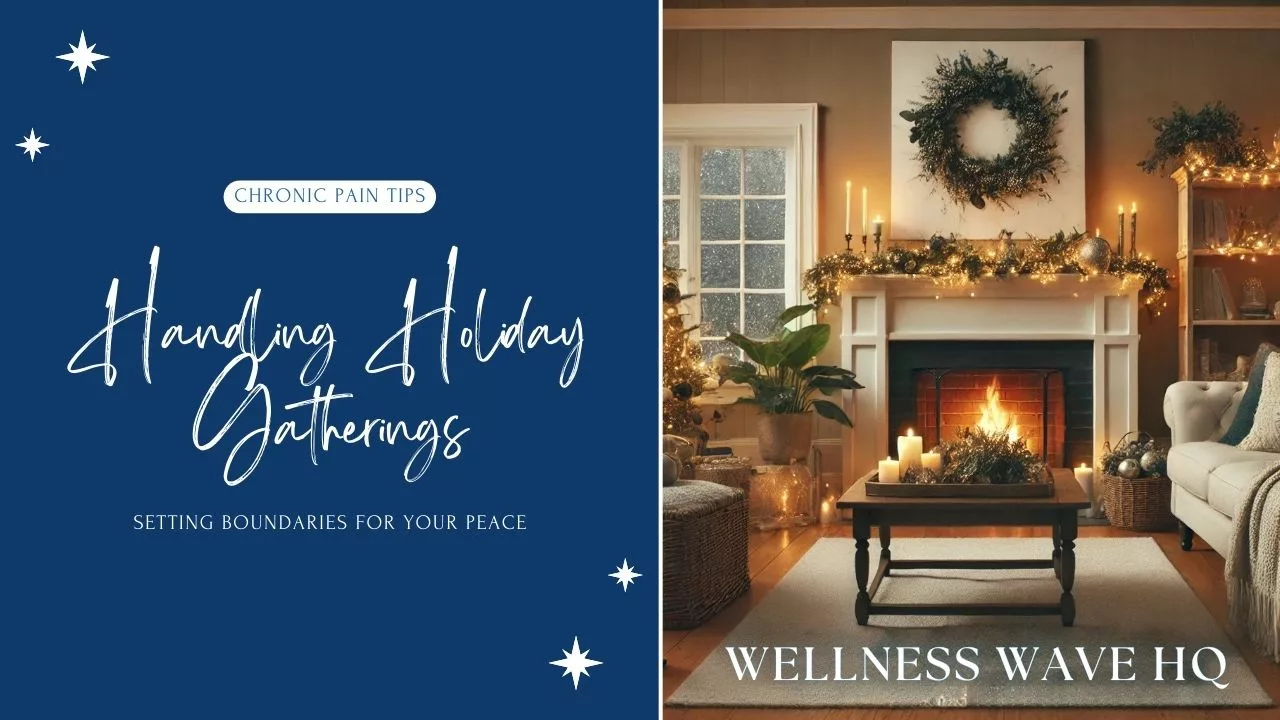
The holiday season is a time of joy, togetherness, and celebration, but for those managing chronic pain or illness, it can also bring unique challenges. From bustling gatherings to long-held traditions, the festive spirit often comes with stress, overcommitment, and physical strain.
But what if you could embrace the holidays in a way that prioritizes your health and well-being? Imagine celebrating the season without guilt or overexertion, while staying true to your needs. With thoughtful strategies, you can redefine holiday gatherings, creating moments of connection and joy on your terms.
Let’s explore how you can set boundaries, manage expectations, and protect your peace during this festive time.
Understanding Your Comfort Zones
Why It Matters
Feeling overwhelmed in social settings often stems from pushing beyond your comfort zones. Recognizing your physical and emotional triggers can help you make empowered choices.
How to Do It
- Identify Triggers: Reflect on aspects of social gatherings—such as noise levels, event durations, or crowded spaces—that amplify discomfort or pain. (This is excellent reason for journaling and keeping a record of triggers.)
- Observe Patterns: Look back at previous events to determine what worked and what didn’t. Did a quieter room or shorter visit make a difference?
- Tune In: Listen to your body’s cues before, during, and after events. Physical signals like fatigue or heightened pain can guide your decisions.
Example: If standing for long periods worsens your pain, prioritize seating arrangements in advance or opt for events with flexible seating.

Communicating Your Needs to Loved Ones
Why It Matters
Open communication is key to fostering understanding and support. Expressing your needs sets realistic expectations and strengthens relationships.
How to Do It
- Be Honest: Let loved ones know your limitations with compassion and clarity. For example, “I’d love to join, but I’ll need to take breaks to rest.”
- Set Expectations: Share your plans early, like attending part of an event or choosing a quieter celebration.
- Practice Kind Boundaries: Use gentle but firm phrases like, “That sounds wonderful, but I’ll need to pass this time to focus on my health.”
Tip: Most loved ones are more understanding than you may expect. Frame your boundaries as a way to ensure you can be present when it matters most.

Practical Tips for Managing Energy at Events
Why It Matters
Balancing activity with rest prevents flare-ups and allows you to enjoy gatherings without overextending yourself.
How to Do It
- Arrive Late, Leave Early: Shortening your stay conserves energy while still participating.
- Find a Quiet Spot: Identify a relaxing area to retreat to when you need a break.
- Take Breathers: Step outside or rest in a comfortable chair to reset.
- Use Mindfulness Techniques: Deep breathing or grounding exercises can help reduce stress.
Example: During a family dinner, excuse yourself for a short walk or quiet moment to recharge without drawing attention.

Preparing an Exit Strategy
Why It Matters
Having a plan for unexpected flare-ups reduces anxiety and ensures you can leave gracefully if needed.
How to Do It
- Drive Yourself: This gives you the flexibility to leave when necessary.
- Coordinate Support: Arrange for a trusted friend or family member to help you exit discreetly.
- Have a Signal: Agree on a subtle signal, like a text or a gesture, with someone you trust to indicate when you’re ready to go.
Pro Tip: Have not just one but two people you trust to have a signal, just in case one becomes unavailable. Also, keep a soothing item, like a favorite playlist or aromatherapy spray, in your bag for comfort during transitions.

Reframing Holiday Traditions
Why It Matters
Adapting traditions allows you to participate in meaningful ways without the pressure of overexertion.
How to Do It
- Simplify Gatherings: Host a smaller dinner or opt for a virtual gathering to connect without physical strain.
- Reinvent Traditions: Make your own traditions. Replace energy-draining activities with more manageable ones, like a cozy night of holiday movies.
- Share the Load: Delegate tasks like decorating or cooking to family members. Do a potluck-style dinner for the holidays.
Example: If baking cookies for an entire family feels overwhelming, invite relatives for a group baking session where everyone contributes.

What’s Next in the Holiday Survival Series?
This article is just the beginning of your journey toward a stress-free holiday season. Upcoming articles will provide targeted strategies to address specific challenges:
- How to Pace Holiday Activities
Learn to balance celebration with rest to prevent burnout. - Coping with Isolation and Emotional Challenges During the Holidays
Emotional support strategies to manage feelings of loneliness or heightened emotions. - Mindfulness Tips for a Calmer, Happier Holiday Season
Simple techniques to ground yourself during the festive rush. - Travel Tips for a Stress-Free Holiday Season
Practical advice for managing discomfort during holiday travel.
Stay tuned as we dive deeper into these topics to help you navigate the season with resilience and joy.
Final Thoughts: Celebrating the Season Your Way
The holidays are about creating joy and connection in ways that honor your health and well-being. By setting boundaries, managing energy, and reframing traditions, you can celebrate on your own terms without overextending yourself.
We’d love to hear how you make the season work for you! Bookmark this page for easy reference and share it with friends or family who might find it helpful. Don’t forget to follow us on Facebook, Instagram, and Pinterest for more tips, guides, and inspiration to navigate the holidays with confidence and peace.
Let’s make this holiday season about meaningful moments and intentional joy—together.
JOIN OUR COMMUNITY!

